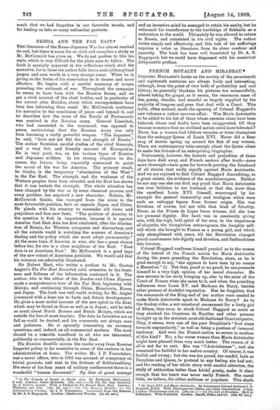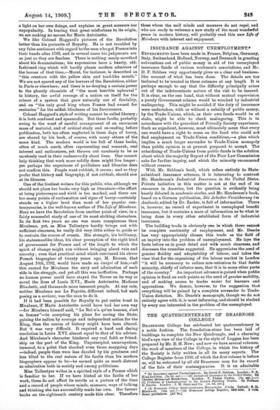FRENCH ROYALTY AND MIRABEAU. 6 COLONEL HAGt3lARD'S books on the society
of the seventeenth and eighteenth centuries are always lively and interesting, although, from the point of view both of probability and real history, he generally blackens his pictures too unmercifully, almost taking for gospel, as it seems, the enormous mass of lies, gossip, slander, and scandal so largely supplied by the majority of tongues and pens that deal with a Court. This habit, often noticed, made the opening of Colonel Haggard's new volumes a rather nervous affair. Was Marie Antoinette to be added to his list of those whose enemies alone have been believed, whose real faults have been exaggerated, till they became monsters that no civilised nation could have tolerated ? Never has a woman had bitterer enemies or truer champions than the unhappy Queen of Louis XVI. Never did a finer crop of stories spring up around the feet of any woman. There are contemporary tales enough about the Queen alone to make the fortune of an enterprising biographer.
Fortunately, however, the hatreds and prejudices of those days have died away, and French seekers after truth—none more thorough—have gone far towards proving the falsehood of all stories that really signify against Marie Antoinette. And we are rejoiced to find Colonel Haggard discrediting, to a great extent, the evidence of the scandalmongers. Neither he nor any one else can find any proof that Marie Antoinette was ever faithless. to her husband, or that she, more than the excellent Louis XVI. himself, encouraged by her example the general immorality and irreligion which were such an unhappy legacy from former reigns. She was frivolous, of course, but not with that kind of frivolity: Never, as the Prince de Lig,ne bears witness, did she lose her personal dignity. Her fault was in constantly giving rein, with the high, bold spirit of her race, to the impatience of etiquette, the thoughtless extravagance, the haughty self- will which she brought to France as a young girl, and which only strengthened with years, till the Revolution changed proud carelessness into dignity and devotion, and foolhardiness into heroism.
Colonel Haggard confesses. himself puzzled as to the reason of the hatred of the French nation for Marie Antoinette during the years preceding the Revolution, since, as he is good enough to say, "she appears to have been by no means a Messalina " (!) Not that, proof or no proof, he can persuade himself to a very high opinion of her moral character. He sees excuses in her early bringing up, also in the state of the Court of France when she came to it, and when the presiding influences were Louis XV. and Madame du Barry, besides other persons of doubtful reputation. Has he forgotten that the commands of the King and of her mother were needed to =lie Marie Antoinette speak to Madame du Barry ? As to the donkey-rides, a not unnatural amusement for a lively girl of fifteen, they seem to shock Colonel Haggard as much as they shocked the Comtesse de Noailles and other persons brought up in the strictest, most old-fashioned Court etiquette. They, it seems, were one of the poor Dauphine's "first steps towards unpopularity," as well as being a pastime of immoral tendency. And were the French nation so severe in matters of this kind ? No; a far worse woman than Marie Antoinette might have pleased them very much better. The reason of it all is not far to seek. She was " l'Autrichienne" ; and she remained too faithful to her native country. Of course, it was foolish and wrong; but she was too proud, too candid, both as Dauphine and Queen, to pretend to any feeling she had not; and the reading of her whole story with careful attention, the study of authorities better than trivial gossip, make it clear enough that her heart was never really French. She cared little, we believe, for either noblesse or populace. This sheds * (1) Louis XVI and Marie Antoinette. By Lieutenant-Colonel Andrew C. P. Haggard, D.S.O. With Photogravure Plates and other Illustrations. 2 vols. London: Hutchinson and Co. 24a. not.)--(2) The Life of Mirabsau. By S. G. Tallentyre. With Portrait.. London; Smith, Elder, and Co. CH% 6c1- net.]
a light on her own doings, and explains in great measure her unpopularity. In tracing that great misfortune to its origin, we are making no excuse for Marie Antoinette.
We like Colonel Haggard's pictures of the Revolution better than his portraits of Royalty. He is not troubled by any false sentiment with regard to the men who got France into their hands after 1789, and in several cases his judgments are as just as they are fearless. There is nothing mealy-mouthed about his denunciations; his expressions have a hearty, old- fashioned ring which will hardly please modern admirers of the heroes of that time,—Marat, for instance, is described as "this creature with the yellow skin and toad-like month." We are not spared any of the horrors of the Revolution, either in Paris or elsewhere; and there is no denying a certain power to the ghastly chronicle of "the most horrible upheaval" in history, the awful revenge of a nation on itself for the crimes of a system that grew naturally out of feudality, and on "the only good king whom France had owned for centuries" for the selfish blindness of his forerunners.
Colonel Haggard's style of writing cannot be called literary ; it is both confused and spasmodic. But these faults, probably owing to the want of careful arrangement of an enormous mass of material, and of critical study and re-reading before publication, both too often neglected in these days of hurry, are shared by his book, of course, with many others of the same kind. The modern world is too full of these books, often of much merit, often representing real research, real interest and enthusiasm, yet thrown out carelessly to be as carelessly read in their undeservedly short lives. One cannot help thinking that work more solidly done might live longer : yet perhaps the experience of publishers and libraries does not confirm this. People want rubbish, it seems; and so they prefer that history and biography, if not rubbish, should aim at its likeness.
One of the liveliest writers for this public, who, although we should not place her books very high as literature—the effort at being picturesque and vivid is too marked, and there are too many points of exclamation and signs of hurry—certainly stands on a higher level than most of her popular con- temporaries; is the well-known author of The Life of Mirabeau. Here we have the Revolution from another point of view, in a fairly successful study of one of its most striking characters. In its first two years no one was more conspicuous than Mirabeau, yet, as Miss Tallentyre hardly brings out with sufficient clearness; he really did very little either to guide or to restrain the course of events. His strength, his brilliancy, his statesmanlike ideas, his clear perception of the right kind of government for France and of the length to which the spirit of change might run without bringing about ruin and anarchy ; even that practical mind which convinced his clever French biographer of twenty years ago, M. Rousse, that August 10th, 1792, would have made an emigre of him,—all this earned for Mirabean the envy and admiration of each side in the struggle, and yet all this was ineffective. Perhaps no human power could have stayed the Terror on its way or saved the lives of Louis X'V.I., Marie Antoinette, Madame Elisabeth, and thousands more innocent people. At any rate, neither Mimbeau nor La Fayette, different indeed, but each posing as a saviour, was the man to do it.
If it had been possible for Royalty to put entire trust in Mirabean, if Marie Antoinette could have had her own way —for Mirabeau himself said, "Le Roi n'a qu'un homme, c'est an femme "—in accepting his plans for saving the State, gaining the nation by courage and independent action for the King, then the course of history might have been altered. But it was very difficult. It required a hard and daring resolution in Louis XVI. almost equal to that of his adviser. And Mirabeau's character hindered any real faith or friend- alp on the part of the King. Unprincipled, unscrupulous, immoral, to a point that shocked even those easygoing days —indeed, people then were less dazzled by his greatness and less blind to the real nature of his faults than his modern biographers appear to be—he earned quite as much distrust as admiration both in society and among politicians.
Miss Tallentyre writes in a spirited style of a Prance which is familiar to her. If we have hinted at the faults of her work, these do not affect its merits as a picture of the time and a record of people whose minds, manners, ways of talking and thinking she has successfully made her own. Her former boas on the eighteenth century made this clear. Therefore those whom the said minds and manners do not repel, and who are ready to welcome a new study of the most wonderful years in modern history, will probably read this new Life of Mirabeau with interest and enjoyment.







































 Previous page
Previous page